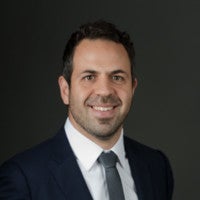
George Papanikitas
SENIOR LEGAL COUNSEL
KIMBERLY-CLARK AUSTRALIA
SYDNEY, AUSTRALIA
The allure of making something real speaks to a lot of people. Writers, manufacturers, artists and architects relish the end product, whatever that may be. For a lawyer, a tangible end product can be difficult to demarcate. But when the result is as ubiquitous as Kimberly-Clark’s products — Kleenex, Huggies and Viva paper towels, to name a few — it’s easy to see that the everyday work leads to everyday products.
The fast-moving consumer goods industry appealed to George Papanikitas, who is now senior legal counsel at Kimberly-Clark Australia, because of its broad impact on ordinary people. Like so many important decisions, there was an element of fraternal inspiration and maybe competition. “My brother worked in the fastmoving consumer goods industry, so I had seen firsthand the passion that can come from working for a company that produces real products that benefit people in their daily lives,” he says.
Papanikitas was also drawn to the opportunity to join a new, lean legal team that tackles the broad range of legal challenges that Kimberly-Clark Australia encounters. He insists that every day is different because of that wide range of legal issues. A visit to the marketing department might entail a meeting about a new commercial campaign and the legal watchouts for that arena. Another meeting may see him identifying regulatory hurdles for product innovations.
Of course, there are also dealings with regulators such as the Australian Competition and Consumer Commission and Australian Securities and Investments Commission. Corporate and tax matters also arise from time to time and are rewarding because they call on his experience as an M&A and funds lawyer, having spent the bulk of his career before joining Kimberly-Clark in large corporate law firms.
He also spends a lot of time working with the supply chain function, including the procurement team. Kimberly-Clark Australia is a huge consumer of third party goods and services, so Papanikitas works with that team to ensure that the company has productive, value-driven relationships with its strategic vendors. Everything from energy to raw material for paper mills to television ad-buys fall under his purview.
Perhaps Papanikitas’ most significant challenge is a symptom of the company’s success: A lot of people make and use Kimberly-Clark products. That means there are a range of risks to carefully manage. “The spectrum includes competition and antitrust, consumer laws, privacy, data protection and product safety — there’s a whole raft of laws that are relevant to the way we do business,” he says.
Kimberly-Clark Australia employs more than 1,400 people. With constant changes to its compliance environment and laws, that involves a lot of training instructions for its various departments, which Papanikitas helps to develop and rollout.
Kimberly-Clark Australia has been operating in the island continent for over 90 years. It is a very mature market. A mature market also presents challenges for growth that drives the need to adapt and innovate. The Australian dollar is fluctuating with the demand for commodities slumping. “The cost of doing business in Australia, by anyone’s measure,” says Papanikitas, “is quite high.”
The key for Kimberly-Clark Australia is to stay at the forefront of its product markets and maintain the competitive advantage they have enjoyed for nearly a century. Fortunately, Papanikitas says, Kimberly-Clark embraces its legal team as a partner in helping the business to identify and drive efficiencies and growth.
From Sydney to Dubai
Papanikitas was born and raised in Sydney. His parents operated a café on Market Street, near the Sydney Harbour Bridge, which he crosses over every day on his way to the office from his home in Surry Hills, a bustling inner city neighborhood not far from downtown Sydney.
He developed an interest in the legal system during high school, which transitioned into studying law and commerce in university.
After earning his bachelor of laws and commerce degrees from the University of New South Wales in 2002, he was admitted as a solicitor of New South Wales later that year. He started his legal practice at Gilbert + Tobin where he was initially on the litigation team. “I loved the adrenaline rush that came from these daily legal skirmishes,” he remembers. The fast-paced, challenging environment was enjoyable but he soon found himself wanting to broaden his horizons.
He moved to the corporate team, where he found that “you’re actually doing deals where your counterparty has as much to gain from negotiations and from the matter that you’re involved in, you’re helping your client to build something,” he says. Papanikitas’ urge to build something was evident during his early career.
While in Gilbert + Tobin’s corporate transactions group, he advised a consortium of private equity investors on the establishment of major healthcare services group, including the acquisition of 15 businesses worth more than A$200 million. During this period, he was also the primary lawyer overseeing the portfolio of a Sydney-based private equity firm which managed a number of investment funds, one of which he helped to launch.
In an Australian rite of passage, he took the opportunity to practice overseas in 2007. He joined the then-new Dubai office of Simmons & Simmons to gain international exposure. Australians, he says, are constantly trying to overcome “the tyranny of distance over here, to see and experience more of the world.” Besides the personal experience, going overseas allows more chances for different ranges of work, in different legal environments.
While Papanikitas had an “overwhelmingly positive experience” and would urge young Australian lawyers to work abroad, he cautions that not all local employers value foreign experience equally. Skills acquired abroad can be perceived as less relevant. There are also unforeseen economic conditions, like a global financial crisis, that can impact one’s timing the return to Australia, so flexibility and patience are key.
There were also challenges to practicing overseas. The laws in Dubai are rapidly evolving and the legal framework is often untested, he says. Timely advice to US or European counterparts who expect a linear, straightforward answer can be difficult to provide. He also had to develop a network of affiliated counsel in other jurisdictions where he was not licensed.
“Going from a situation where you’re accustomed to giving a definitive and clear answer or advice, to a situation where you’ve got to qualify your advice to account for unpredictable outcomes, was challenging,” Papanikitas explains.
After over four years in Dubai, he moved back to his hometown with the knowledge that he could tackle unforeseen obstacles and challenges and moved in-house at PricewaterhouseCoopers. The move from private practice to in-house was a rather smooth transition for Papanikitas because he had become a repeat, trusted advisor to a number of corporate clients whose business he knew well.
The major difference he noticed was the way that you are valued. In private practice, there is an objective measure of one’s worth — the lawyer’s billing. In-house value can be harder to quantify, and involves constantly demonstrating that you are aligned with, and accountable for the company’s strategy and corporate objectives, much more than the way we often, historically at least, perceive legal advisors.
After working on transactional matters for so long, he couldn’t resist the opportunity to help to build a real team, making real products, at Kimberly-Clark Australia.
Getting to Know… George Papanikitas
WHAT’S YOUR FAVORITE HOBBY?
I am pretty into photography. I’ve got a fair bit of a kit that I’ve invested in over time and when I’m traveling I’m keen to get out my camera and snap away.
IF YOU COULD VACATION ANYWHERE IN THE WORLD, WHERE WOULD YOU GO?
I’m a huge fan of the Balearic Islands in Spain, Mallorca and Eivissa. I love getting out there and do so whenever I can, definitely.
WHAT’S YOUR COMMUTE LIKE?
On a sunny day, my commute involves getting on my Vespa and riding across the Harbour Bridge or otherwise taking the train and amusing other commuters with my old school printed paper, something that people find increasingly novel it seems.
WHAT ARE YOU READING?
I just picked up a good book called When to Rob a Bank by the guys who wrote Freakonomics and Super Freakonomics. It’s based on their blog entries including one that they wrote for the New York Times.
AS THE SON OF RESTAURANT OWNERS, WHAT’S YOUR FAVORITE FOOD?
Japanese, hands down. I am a huge fan of Japanese cuisine and culture. I’ve made many visits to Tokyo and I think it’s fair to say that the food is a huge part of that.




